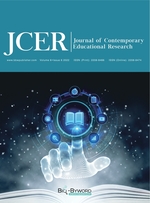Abstract
The present situation of English writing in junior high schools includes the following aspects: first, students are weak in English writing because they lack vocabulary and do not use vocabulary appropriately; second, they often make grammar errors in writing; as a result, they do not obtain high scores in English writing; third, they form sentences based on their habit of thinking in their mother-tongue because of the influence of mother tongue transfer; in that case, Chinglish often appears in their compositions, and this is one of the main reasons they do not obtain high scores in English writing; finally, they do not arrange their compositions well, so most of their compositions are loosely organized. As reading and writing are designed as two separated parts in most English textbooks used in China, it is a challenge for teachers to design post-reading activities to integrate reading and writing because it is time-consuming. Based on the present situation of students’ English writing and the teaching situation of English writing in junior high schools, this paper will discuss how to utilize post-reading activities to help students memorize vocabulary effectively, use vocabulary and grammar appropriately, avoid the influence of mother-tongue transfer, and build compact structures, so that they can improve their English writing skills. This discussion is based on the awareness of integrating reading with writing and making reading a supportive element of writing by utilizing post-reading activities.
References
Raimes A, 2002, Teaching Writing, in Methodology in Language Teaching: An Anthology of Current Practice, Cambridge University Press, New York, United States.
Lin C, 2008, The Problems and Reflections of Designing Post-reading Activities in Reading of Senior High School. Foreign Language Teaching in Schools, 2008(11): 35–40.
Dai J, Zheng C, 2011, Post-reading Activities of Reading Teaching: Design and Implement, Zhejiang University Press, Hangzhou, China.
Ni S, 2015, A Tentative Discussion on Post-reading Activities of Reading in Senior High Schools and the Effectiveness of Reading Teaching. Course Education Research, 2015(31): 92.
Barnett MA, 1988, Teaching Reading in a Foreign Language. ERIC Digest, 1988(12): 4–6.
Lazar G, 1993, Literature and Language Teaching, Cambridge University Press, Cambridge, United Kingdom.
Kramsch C, 1993, Context and Culture in Language Teaching, Oxford University Press, Oxford, United Kingdom.
Ur P, 2012, A Course in English Language Teaching, Cambridge University Press, Cambridge, United Kingdom.
Ferris D, Hedgcock J, 2005, Teaching ESL Composition: Purpose, Process and Practice (2nd Edition), Lawrence Erlbaum, Mahwah, New Jersey, United States.
Renandya WA, Jacobs GM, 2002, Extensive Reading: Why Aren’t We All Doing it?, in Methodology in Language Teaching: An Anthology of Current Practice, Cambridge University Press, New York, United States.
Li H, 2012, The Influence of Teaching Lexical Chunks on Junior High School Students’ Writing Ability. Shangdong Normal University.
Moon R, 1998, Fixed Expressions and Idioms in English, Clarendon Press, Oxford, United Kingdom.
